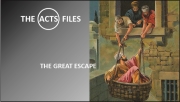 This is the story of a young, upwardly mobile, well-educated family man. He was born a citizen of the greatest empire on earth, and a national of the people of God. He entered the greatest graduate school of his country, learned under its finest instructor, graduated top of his class. He entered into one of the highest religious/political institutions his nation offered.
This is the story of a young, upwardly mobile, well-educated family man. He was born a citizen of the greatest empire on earth, and a national of the people of God. He entered the greatest graduate school of his country, learned under its finest instructor, graduated top of his class. He entered into one of the highest religious/political institutions his nation offered.
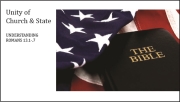 Since his creation man has been a political creature, living within both the kingdom of God (where honor is bestowed to God) and the kingdom of politics (where honor is bestowed to men). The harmony found between the kingdom of God and the kingdom of man which existed in the Garden is no more; we live in a fallen state in which these two kingdoms often oppose one another.
Since his creation man has been a political creature, living within both the kingdom of God (where honor is bestowed to God) and the kingdom of politics (where honor is bestowed to men). The harmony found between the kingdom of God and the kingdom of man which existed in the Garden is no more; we live in a fallen state in which these two kingdoms often oppose one another.
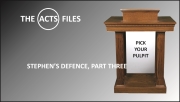 In light of what we learned yesterday, we need to find ways to tell the lost about Jesus. My friend Bill Jack (of Worldview Academy) challenges his students to “pick a pulpit”. That is, to find what interests them and use it as a pulpit, or platform, for communicating Biblical truth. Some of the ideas he presents are:
In light of what we learned yesterday, we need to find ways to tell the lost about Jesus. My friend Bill Jack (of Worldview Academy) challenges his students to “pick a pulpit”. That is, to find what interests them and use it as a pulpit, or platform, for communicating Biblical truth. Some of the ideas he presents are:
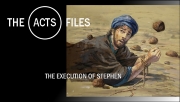 We last left Stephen about to give his defense in Acts chapter 7, but instead of a legal defense he gave a defense of his faith. It’s unclear if Stephen knew he had been trapped by the traditional Jewish leadership, either way you have to admire his priorities.
We last left Stephen about to give his defense in Acts chapter 7, but instead of a legal defense he gave a defense of his faith. It’s unclear if Stephen knew he had been trapped by the traditional Jewish leadership, either way you have to admire his priorities.
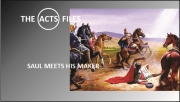 Most of the readers of this site are probably too young to be familiar with the Saturday morning cartoon series Super Friends, but that show had the best narrator voice in the history of cartoons. Why do I bring this up? Because he would always use the transitional statement “Meanwhile…”. For instance, “Meanwhile, at the Hall of Justice…” Luke’s transition into chapter 9 brings back fond memories.
Most of the readers of this site are probably too young to be familiar with the Saturday morning cartoon series Super Friends, but that show had the best narrator voice in the history of cartoons. Why do I bring this up? Because he would always use the transitional statement “Meanwhile…”. For instance, “Meanwhile, at the Hall of Justice…” Luke’s transition into chapter 9 brings back fond memories.
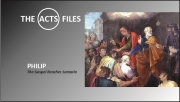 Following the death of Stephen the Christ-following community scattered from Jerusalem. Those who remained were often ostracized from their families and the synagogue communities and many were imprisoned and executed. In Acts 8.4 Luke follows one of the other new deacons, a man named Philip “down” to Samaria.
Following the death of Stephen the Christ-following community scattered from Jerusalem. Those who remained were often ostracized from their families and the synagogue communities and many were imprisoned and executed. In Acts 8.4 Luke follows one of the other new deacons, a man named Philip “down” to Samaria.
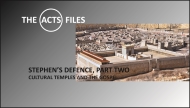 Before picking up where we left off yesterday I’d like you to celebrate this post with us at Think-Biblically.com, which is our 100th article! We hope you have enjoyed reading as much as we have bringing these articles to you. Now back to business…
Before picking up where we left off yesterday I’d like you to celebrate this post with us at Think-Biblically.com, which is our 100th article! We hope you have enjoyed reading as much as we have bringing these articles to you. Now back to business…
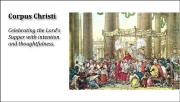 Tomorrow the liturgical church celebrates Corpus Christi, a Christian feast celebrating Communion. Most protestant churches do not celebrate the event as it is a decidedly Catholic invention, and one that espouses a very different theology surrounding the Communion elements (bread and wine) than does the non-liturgical churches. Because of the theological element its worth understanding the holiday.
Tomorrow the liturgical church celebrates Corpus Christi, a Christian feast celebrating Communion. Most protestant churches do not celebrate the event as it is a decidedly Catholic invention, and one that espouses a very different theology surrounding the Communion elements (bread and wine) than does the non-liturgical churches. Because of the theological element its worth understanding the holiday.
 One of my favorite stories in the New Testament is that of Philip and the Ethiopian (Acts 8.26-.40). An angel sends Philip from Samaria south to Jerusalem (about 65 miles) and on to Gaza on the far southwestern shore of Israel (another 34 miles). Following Philips path is a journey of around 100 miles.
One of my favorite stories in the New Testament is that of Philip and the Ethiopian (Acts 8.26-.40). An angel sends Philip from Samaria south to Jerusalem (about 65 miles) and on to Gaza on the far southwestern shore of Israel (another 34 miles). Following Philips path is a journey of around 100 miles.
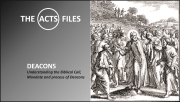
Deacons were the first leadership team established in the early church and as such their importance should never be diminished. In Acts chapter six we read about the origins of Deacons, one of whom becomes Christianity’s first martyr. They were men of faith, full of the spirit, and some of them performed signs and wonders just like the apostles themselves. Their role was to serve the ministry needs of the body generally and as arbiter when conflict arose.
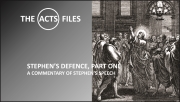 As remarked earlier, Stephen is not providing a legal defense of his words or actions, nor is he responding to the false accusations against him. Instead he gives a clear defense of his faith using the Torah (that is the law, or portions of the Old Testament) which the Sadducees adhere to.
As remarked earlier, Stephen is not providing a legal defense of his words or actions, nor is he responding to the false accusations against him. Instead he gives a clear defense of his faith using the Torah (that is the law, or portions of the Old Testament) which the Sadducees adhere to.
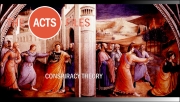 The storm brewing would take form as a conspiracy (Acts 6.8-8.1). When last we read acts it was discovered that a large number of priests became followers of the Messiah, threatening the power-base of the high council and giving credence to the testimony of the apostles. Luke doesn’t provide details to anything that he wasn’t present to account for, but by reading between the lines we can flush out the secrets of the Sadducees.
The storm brewing would take form as a conspiracy (Acts 6.8-8.1). When last we read acts it was discovered that a large number of priests became followers of the Messiah, threatening the power-base of the high council and giving credence to the testimony of the apostles. Luke doesn’t provide details to anything that he wasn’t present to account for, but by reading between the lines we can flush out the secrets of the Sadducees.

